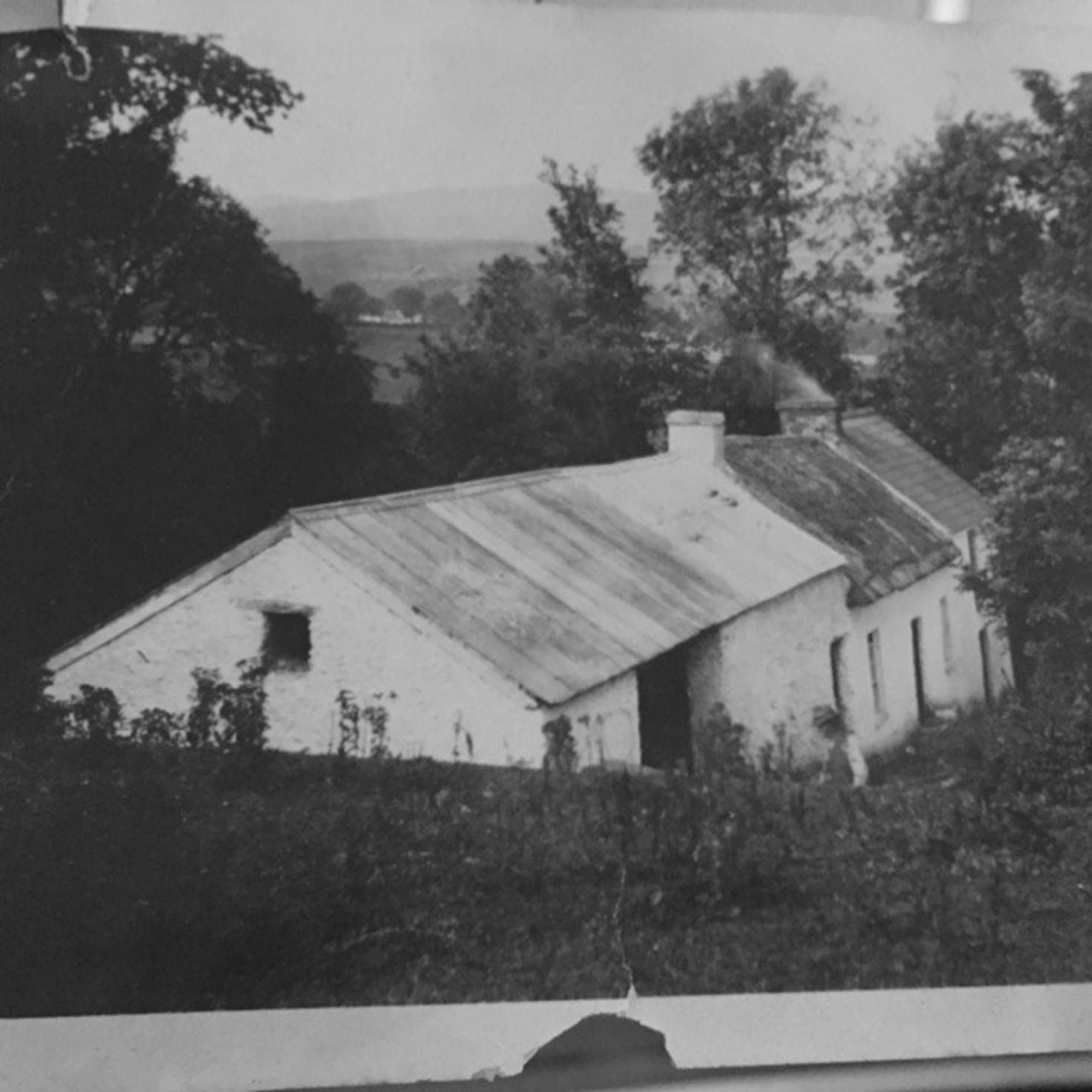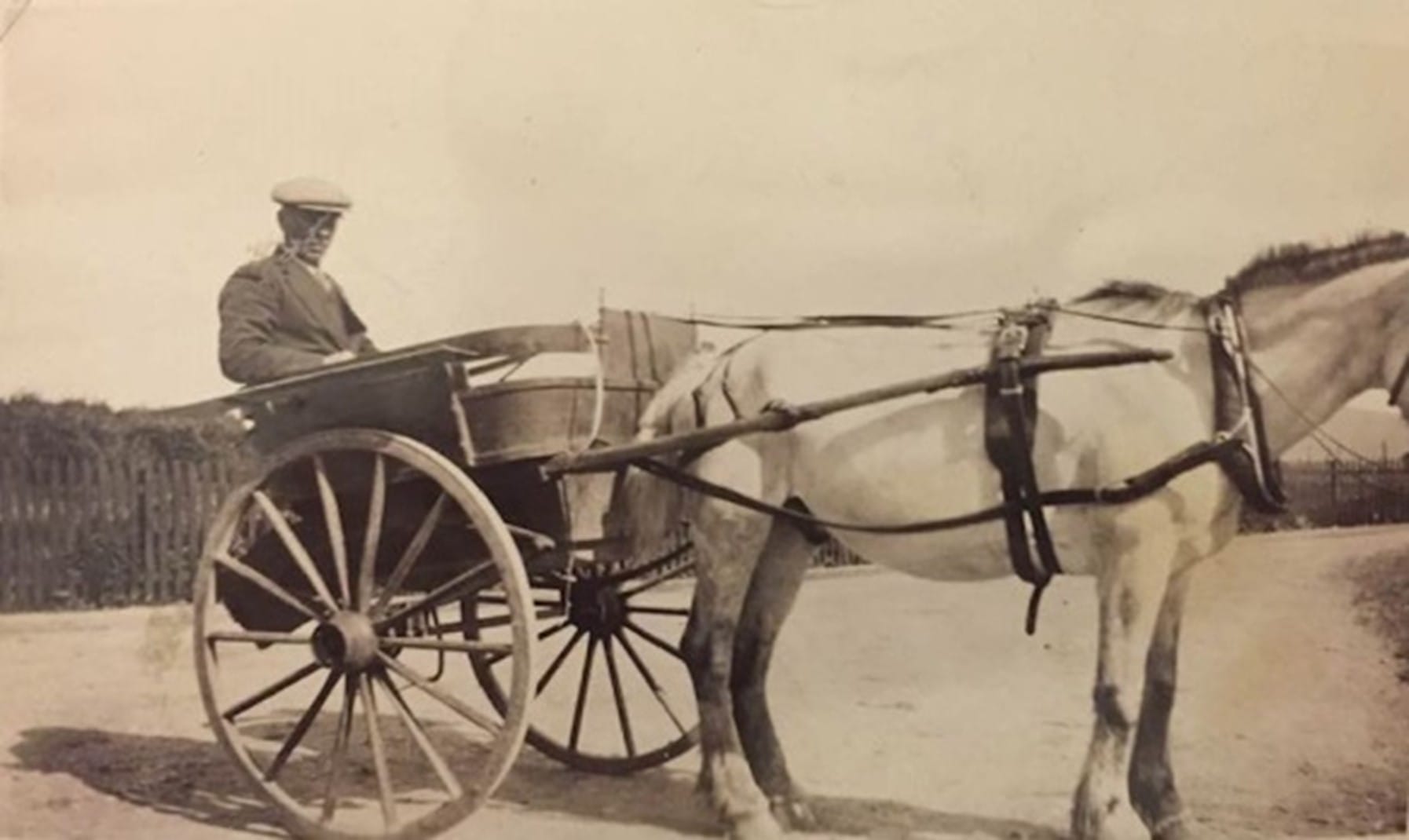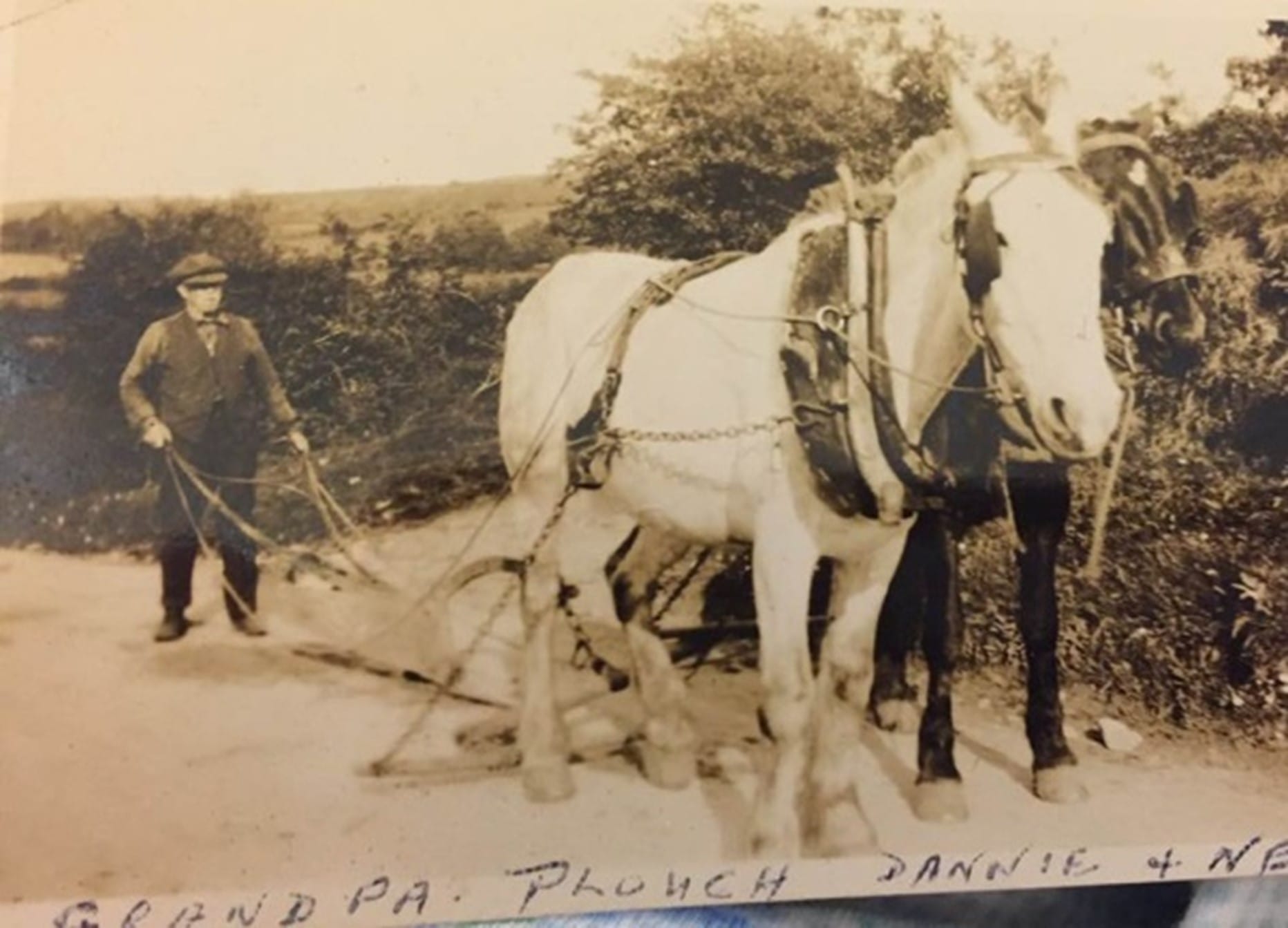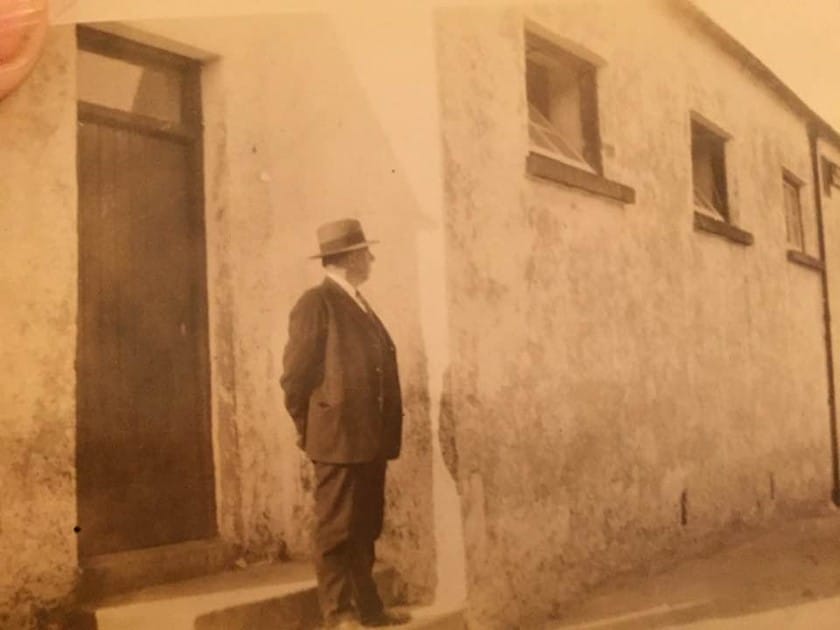Born in Tullybrick, Sixtowns in 1832, James Gillaspie (Gillespie) set out for America not knowing that he would survive virtually all of the tests which Irish emigrants to America would face and sadly fail in many cases. He would survive the perilous storms which his old wooden sailing ship would encounter on its six weeks and three days long journey across the Atlantic ocean. He would be struck down with the fever on the voyage and survive after being left to die. He would be taken in by other Gillaspies in New York and do well enough to eventually move to the state of Iowa where he would buy a piece of farmland and make a success of it. Then just when all the perils seemed to have been put behind him, he gets drafted into the army during the brutal American Civil War. Again he survived the war after marching and fighting all the way from Atlanta to the east coast of the U.S.A. with General Sherman as he closed the net on General Lee and the remnants of his Confederate army. It is doubtful that he was even aware that this great General T Sherman was in fact married to his cousin. After the war he returned to raise his family on his farm not far from the city of De Moines. Nevertheless, James Gillaspie`s story is one which any emigrant of his time would have given their right arm to have been able to tell.
There was a time when the lower end of the townland of Tullybrick was full of Gillespies. In fact there was at a time, a clachan of Gillespie houses, sited close to Tullybrick Glen. As time went on and living conditions became cramped and overcrowded, quite a few of these Gillespies chose emigration as a way out of their predicament. They went to Britain and moreso to America. James Gillespie`s grandfather, John, had six brothers and while five of them remained in Tullybrick, most of their children emigrated to America, to places like New York and Pennsylvania. All these Gillespies seemed to have multiplied states side, down the years while the Gillespies at home just grew smaller in numbers to the point where today, there is not a Gillespie left in Sixtowns.


This is the house where James Gillaspie was born in Tullybrick

Old church
It was not surprising then that James Gillespie would follow family tradition and head for America to seek a better life where he would be met and helped by members of the Gillespie clan who were well settled there. James was born on March 8th 1830 to parents Michael and Anne (Crilly) in the townland of Tullybrick. On reading his diaries, he comes across as a very intelligent and cultural young man. In his diaries he refers to the Old Church of Screen, at Moneyconey which lay close to his home and is able to freely refer the local folklore and history which is attached to this venerable place.
He also writes about going to school in Altayeskey and even though he missed time while helping out on the farm, he could stay ahead of the regular scholars in his schoolwork. He was even able, as a pupil, to have a discussion with his teacher, Master McBride, about the proper spelling of his surname. His teacher convinced him that the proper spelling was Gillaspie. He tells us that he then spelt it that way from thatstage onwards. He remembered the Night of the Big Wind, on January 6th 1839, he said. He talked of going to school in the wintertime and staying off in the summer to herd the cattle. He remembered making his confirmation at the age of 10. All in all, his early life seemed to be the ideal life of innocence and security. This would soon change for young James Gillaspie.

James (Peter) Gillespie, worked the farm on which his namesake James was born.

James (Peter) Gillespie, getting ready to open potato drills in Tullybrick. James was part of the family who remained at home.
In the Spring of 1852, James left Liverpool on an old wooden ship heading for New York. On the journey, the fever broke out among the passengers and many died before the ship arrived in New York after a journey of six weeks and three days. Sometime before his ship reached New York, James took the fever and on arrival he was sent to quarantine on Staten Island, which was usually a one way trip. His comrade, sure that James would die and would not need them, took two sovereigns from his pocket and headed on his way. Six weeks later,t James recovered and was claimed by his aunt and taken to her home in New York. He lived in New York for four years, in Bloomingdale and described it to be like the countryside and beautiful. He would revisit the place 50 years later and not be able to recognise anything bar the bends in the Hudson River.
On April 6th, 1856, James married Anne Kirwan from Co. Meath. A couple of years earlier some of the Gillespie clan had gone out west to the state of Iowa where good farmland was being made available for sale at attractive prices. They recommended the place to James and other family members and as a result, he and his wife headed for Iowa. They were shocked at how wild and isolated Iowa was when they arrived. The city of Des Moines is the present day capital city of Iowa but when James arrived there it was but a village of about four stores. In fact he was offered land at a place which would now be in the centre of the city. Being a Sixtowns man, born and reared in the hills, James turned down the offer of flat land, close to the town and instead, headed some distance into the hills to buy the land for his farm. He built a house on his land and over the next 12 years he would break the rugged landscape of the prairie into land fit for farming. He reared a family of seven, one son died in infancy. James came to love Iowa and the wild countryside in which he lived and all was going well until the draft notice arrived calling him to sign up for military duty. We get the immediate impression that James was a very dutiful man. Here we have a father with a wife and seven young children, even though his brother Frank in Willmington, volunteered to go in his place, insisted on doing his duty for his new country. He had always been lucky in his adventures and he would now need the best luck possible to come through his impending trials. He would be thrust into the middle of a war zone far from home, in which every day, life was but a lottery. He would march with General Sherman on his famous 280 mile drive from Atlanta to Savannah on the east coast. He would see the destruction of small towns, battles, 30 hour marches both at night and daytime and suffer hunger, cold and lack of sleep on an on going basis.It was a measure of the nature of the man that he saw fit to keep a war diary in which he logged what happened each day so that people could get an in depth idea of what it was like to have been in his shoes. He tells us that his commander is related to his uncle who lived on a farm south of Pittsburgh and became close to the Sherman family afterwards. After Sherman reached and captured the strategic port of Savannah they turned north to chase down the remnants of the Confederate army and to force General Lee into surrender. He was present when Sherman took the Confederate Capital of Richmond and there after accepted Lee`s surrender. They would stay on the march through, Georgia, South Carolina, North Carolina and then Virginia, mopping up any remaining resistance. They would eventually end up marching into Washington at the war`s end. He records events in his daily diary with a deep sense of the futility of war as he describes events which he often felt did not need to happen, like the wanton killing and destruction of infrastructure, property and buildings. This was in contrast to the Union Army`s policy of destroying everything which might help the Rebel cause and prolong the war.
James Gillaspie, the lucky little man from Tullybrick was lucky once again and a few months later arrived back home from war to Iowa, unscathed and well. He would go back to the life which he loved, farming again. He had just survived another massive hurdle in his life.
On July 11th, 1899, James decided to fulfil his lifetime dream of doing a return visit to his beloved Sixtowns, to “the graves of my parents and the green churchyards where my forefathers sleep.” His was a dream which so many emigrants held for their entire lives but were never able to realise them. However, this eventually became possible with the coming of the steam liner, one of which James travelled to Liverpool on, before catching a boat to Belfast. Once again the perceptive writer and poet comes out as he recounts in his diary, his journey from Iowa to Tullybrick. He calls at several towns on his way to New York, where Gillespie family members had settled, like, Pittsburgh, Pennsylvania, Philadelphia, Wilmington, Camden, Chesterand in New York itself. This gives us a great insight as to where the Gillespies all went after they left Tullybrick. Again he records everything about his journey from places,to exact times of arrival. He talks about taking the train from Belfast to Draperstown. He was back in his beloved Ballinascreen after being away for 47 years and six months.
It is then that James takes off in his poetic style as he speaks of meeting his people again, the kindness shown to him and the beautiful countryside which he would spend the best part of his three month holiday in.
“I want to climb its lofty mountains, to gaze on its beautiful green valleys and to drink once more from its cool crystal fountains.”
During his stay in Sixtowns he tells us that,
“I have seen and meditated on all that I went there to see. I have wandered through the valleys and have stood on her mountains. I have bathed in her waters and I have prayed in her cemeteries and mourned for relatives long passed on.”
James Gillaspie also did an amazing amount of touring during his holiday and eventually bade his last farewells to family, relatives and neighbours before heading off to Belfast to catch his ship back to America. If ever there was a person to personify what most emigrants leaving had in their minds as to what would be their ideal fate, then James Gillaspie, the lucky emigrant from Tullybrick, would not be far off the mark.
As well as giving us such a detailed account of his visit home and in such descriptive and poetic terms he also leaves us a poem which he wrote afterwards, about his beloved place of birth.
It may not be Heaney but for a man who hardly went to school in Altayeskey, he gives us a personal insight into the emigrants plight of his era. Just like our other local poet Geordie Barnett, his poems are more of a chronicle of past times in the Sixtowns. James writes in his poetry about things which we tend to forget, like how parents would never see their sons and daughters again when they left, how friendships, from the cradle, were broken for ever and about how the emigrant in his or her last days would take their final looks around that place of their birth and childhood memories. These are sentiments which we tend to overlook when we discuss emigration from our areas to America. These people were going, literally, to a new world.
He manages to get into this prose, so much of the emotions and challenges faced by so many people, not just in Sixtowns, but all over Ireland. He was clearly a deep thinker with a great appreciation of pride of place and the living and the dead therein. In his diaries, he leaves with an example of the love of his homeland when he logs that on the way back to America from Liverpool, his ship stopped at Cobh, Co. Cork for a couple of hours before he took his last look at his beloved land as his ship headed out into the Atlantic ocean.
Note : The Diaries of James Gillaspie were kindly donated by Patsy McWilliams (Shinnegan) , R.I.P. who was a grand nephew of James. This happened as a result of a chance conversation with Patsy about emigration and so that connection between Gillaspie and his native place was renewed once more, after over 100 years.

Frank Gillespie (New York) visits Altayeskey school while on holidays in Tullybrick.
The Country of Sweet Liberty.
by James Gillaspie.
Oh green were the hills of the fair county Derry,
When a self-exile, I did leave my dear home.
I left it to roam through the wild world so dreary,
A cold dreary world of sorrow and gloom.
Oh, think of the grief at the moment of parting,
Yes, parting from fond ones no more to be seen.
No wonder the sad torrents of tears were starting,
As I cast my last look over sweet Ballinascreen.
A grief stricken parent was weeping in sorrow,
Young brothers and sisters could no longer play,
For before the bright sun would gladden the morrow,
Their own darling brother he would be far away.
Far off from the scenes of his young heart`s devotions,
Loved scenes of his childhood, where happy he`s been,
Oh, wild throbbed his heart with stifled emotions.
To see the last sunset o`er Ballinascreen;
I gazed over the valleys where the daisies were glowing.
The valley I loved was most charming and gay,
My friends and companions were all to me flowing,
To say their last farewells, ere I`d go away.
I looked at the sky. It was brighter than ever,
The birds sang their songs, all nature serene.
“Oh God,” I exclaimed, “Why must I sever,
The tentacles that clasp me to Ballinascreen.”
Long years have gone past, i`ve since ceased my weeping,
No longer I battle the cold world alone,
While hearts that I clasped there are all now sleeping,
And lips that I kissed are long under stone.
Yet sadly and often, I gaze o`er the prairie,
And often in bright visions I see,
The beautiful hills of my beloved county Derry,
And the dear ones circled in old Ballinascreen.
